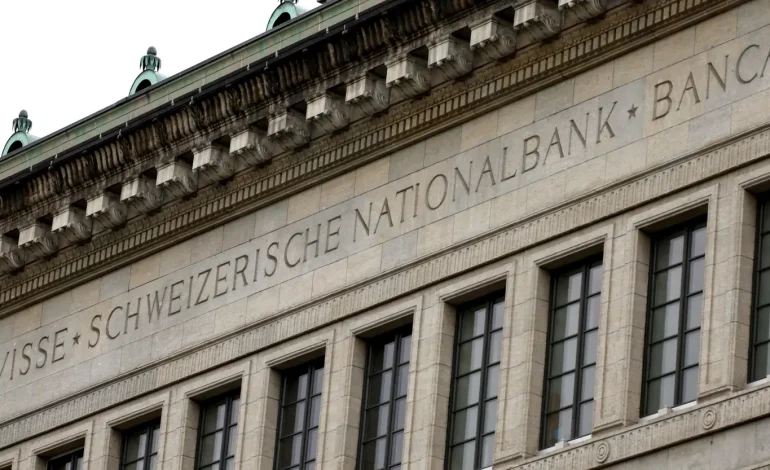The Swiss National Bank (SNB) surprised markets on Thursday by cutting its key interest rate by 50 basis points, reducing it from 1% to 0.5%.
The move exceeded economists’ expectations for a smaller 25-basis-point cut and marked the fourth rate reduction this year. The decision comes amid ongoing challenges posed by a strong Swiss franc, subdued inflation, and weaker export demand.
The 50-basis-point reduction represents the steepest cut since January 2015, when the SNB abruptly abandoned its minimum exchange rate with the euro. The latest move reflects the central bank’s efforts to stay ahead of expected rate cuts by the European Central Bank (ECB) and other major central banks.
Prior to the announcement, over 85% of economists polled by Reuters had forecast a smaller, 25-basis-point reduction. The unexpected nature of the larger cut sent ripples through currency markets. The US dollar rose by 0.4% against the Swiss franc, while the euro gained 0.57% against the franc following the decision.
The SNB’s decision also precedes expected moves by other central banks, with the ECB widely expected to cut its rate by 25 basis points later in the day, while the US Federal Reserve is set to meet on Dec. 18. The Bank of Canada had announced a 50-basis-point cut the previous day.
The decision was driven by several factors, including:
- Weaker Inflation: Switzerland’s annual inflation was 0.7% in November, up slightly from 0.6% in October but still within the SNB’s 0-2% target range. The SNB has now forecast inflation at 1.1% for 2024, 0.3% for 2025, and 0.8% for 2026, reflecting lower-than-expected prices for oil products and food.
- Swiss Franc Strength: The franc’s appreciation has weighed on Swiss exporters by making their goods more expensive in global markets. The currency’s rise, driven in part by safe-haven demand amid geopolitical uncertainty and slowing global trade, prompted the SNB to act decisively.
- Economic Uncertainty: The Swiss economy recorded “below-average growth” of 0.2% in the third quarter, down from 0.4% in the previous three months. Exporters, particularly in the technology and industrial sectors, have reported lower sales orders and shrinking margins.
“Underlying inflationary pressure has decreased again this quarter,” the SNB said in a statement following the decision. “The SNB will continue to monitor the situation closely and will adjust its monetary policy if necessary to ensure inflation remains within the range consistent with price stability over the medium term.”
The SNB’s new chairman, Martin Schlegel, oversaw the decision, marking a shift from the incremental 25-basis-point cuts implemented earlier this year under former chair Thomas Jordan. Some analysts believe the larger cut signals a more aggressive approach to monetary policy under Schlegel’s leadership.
UBS economist Alessandro Bee noted:
“Low inflation and risks to the European economy and, thus, to the Swiss economy may have been major drivers for this rate cut.”
He added that the SNB’s move was likely aimed at preemptively countering further appreciation of the Swiss franc.
FX market analyst Kyle Chapman of Ballinger Group said:
“More cuts are coming, and zero interest rates are on the cards as soon as June. The 0.3% conditional forecast for next year is probably too close for comfort for policymakers, especially given the recent record of revising these down at every single meeting this year.”
If the SNB opts for further rate cuts, it could edge closer to the reintroduction of negative interest rates, which were in place from 2014 to 2022. The central bank has not ruled out such a move, with Schlegel stating in November that negative rates remain an option in the SNB’s policy toolkit.
The appreciation of the Swiss franc poses a significant challenge for exporters, making Swiss goods more expensive for foreign buyers. The franc’s rise has been driven by its status as a safe-haven currency amid geopolitical risks and concerns about the global trading system.
Exporters, particularly in the technology and industrial sectors, have reported weaker sales and shrinking margins. Swissmem, an industry association for Switzerland’s technology sector, recently noted that “key indicators do not point to a recovery any time soon” and called for greater political efforts to facilitate access to new markets.
The Swiss National Bank’s surprise 50-basis-point rate cut highlights its determination to tackle inflation, counter the appreciation of the franc, and support the Swiss export economy.
CNBC, Reuters, and the Wall Street Journal contributed to this report.









